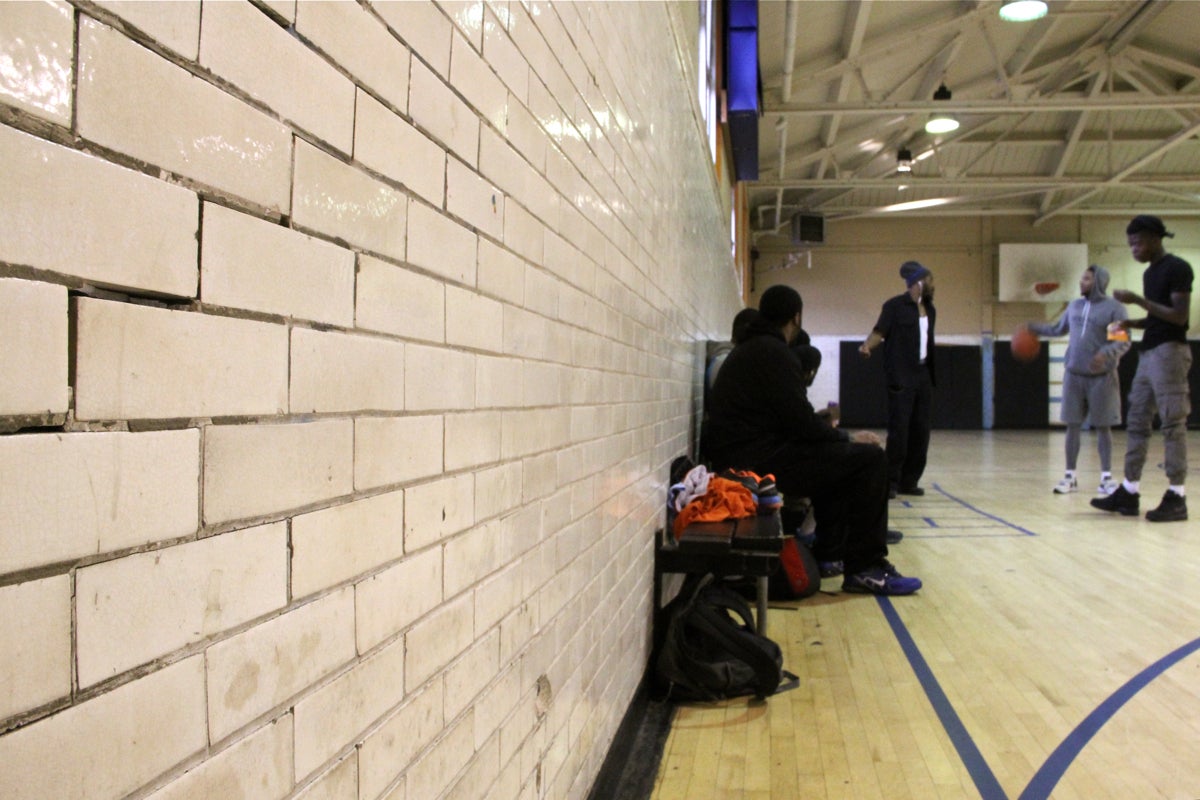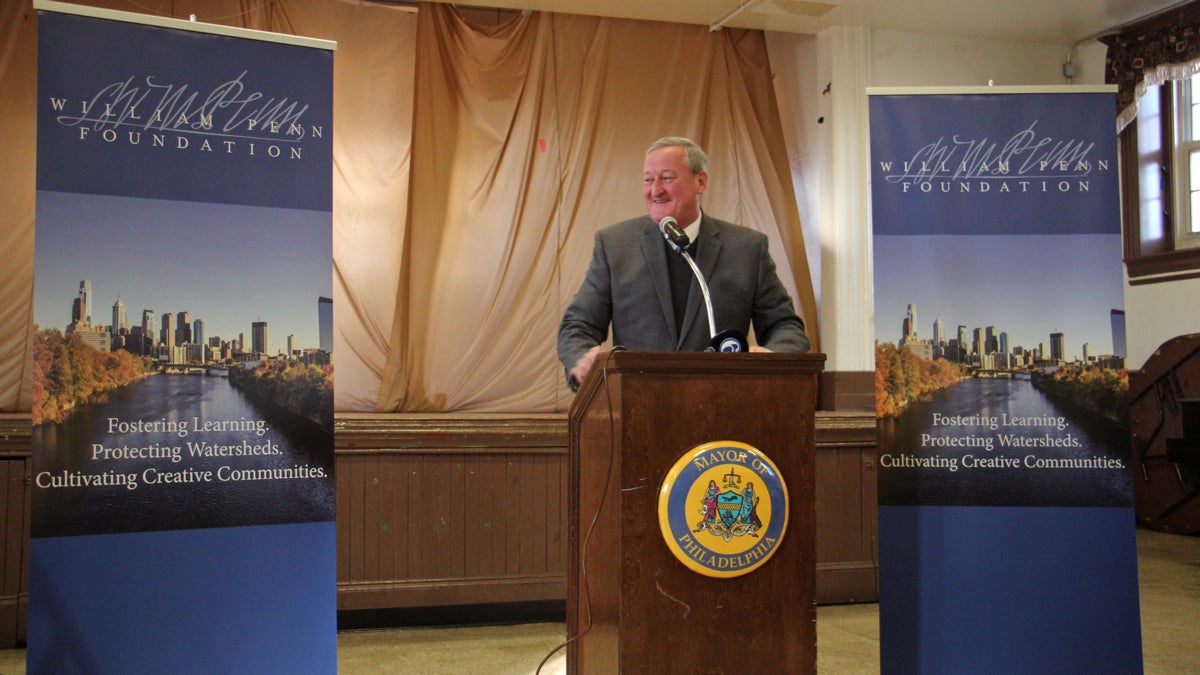Mayor Kenney announces first rec ‘rebuild’ as clash over union diversity heats up

Dilapidated Vare Recreation Center in Grays Ferry will be the first city facility improved through Mayor Jim Kenney’s stalled soda tax-financed upgrade for parks, rec centers and libraries. Announced at a press conference held Wednesday at the partially operational 100-year-old center, the news came with a strong political undercurrent as the mayor used his time behind the mic to double down on his intentions to jumpstart the initiative, known as Rebuild, with or without the support of City Council. The point was first made in a fiery letter sent on Friday.
“If we don’t act soon, we’ll have to close it again,” Kenney said. “Rec centers like Vare are the reason we proposed Rebuild and passed the beverage tax in the first place.”
The mayor tried his best to sound upbeat as he spoke to reporters at the long-neglected 2600 Morris St. center but his words reflected the strain of a budget season riven with conflict over Rebuild’s union diversity goals, his proposed property tax increase and spiking home assessments that will further hike tax bills in many parts of the city, including the Grays Ferry and Point Breeze neighborhoods served by the rec center.
“Today, I’m happy. We just announced a major re-do project of a rec center that serves thousands of people in the community and whose kids — many live in poverty — need the opportunity for a place like this,” he said. “I was in Council for almost 24 years. I understand people want to hold things up sometimes. want to have their input, want to have their say. I understand all that because I did it myself. In the end, I expect we’ll come to some conclusion.”
The clash over Rebuild centers around an agreement between the mayor and building trades union leader John “Johnny Doc” Dougherty outlining union hiring plans to meet the initiative’s ambitious job creation goals.
Under a memorandum of understanding signed May 3 by Kenney and Dougherty, a longtime ally of the mayor, the construction unions committed to a goal of 40 percent minority participation and 5 percent female participation “in the building trades workforce in the Philadelphia area.”
After more than two years of discussions, Kenney believes the agreement and the underlying plan hammered out with local labor leaders is enough to guarantee a joint commitment to city goals for minority hiring and inclusion.
“I don’t know what else they want. A blood oath?” Kenney said on Wednesday. “My signature is now on [the MOU]. [John] Dougherty’s signature is now on it. We’ve got to move forward. You can find 20 different reasons to slow-walk this thing and it’s not fair.”
Rebuild’s promise to create jobs for Philadelphia residents and diversify the local building trades has been a major selling point for the initiative. The most recent publicly available demographic data for local construction unions date back to 2008 and shows that a majority of the labor organizations had less than 10 percent black membership at the time.
Council members fear that because the May 3 MOU, which they originally requested at a hearing in March, was only signed by Dougherty, business manager of Local 98 of the International Brotherhood of Electrical Workers, it would not be legally binding for other construction unions. As it stands now, the commitment is too vague and lacks the teeth needed to guarantee results, they say.
“We are very cognizant of the fact that Rebuild is a great opportunity to bring jobs to our residents,” said Councilwoman Maria Quiñones-Sánchez. “With the convention center, we had a similar deal [with the unions] and the conditions were ultimately not met, so we wanted to make sure that whatever we had this time was way more solid. Everybody is frustrated that we can’t get to that place.”
The 2008 diversity plan and commitment [pdf] referenced by Quiñones-Sánchez was signed by representatives from separate unions.
As a result of the ongoing stalemate, the council has refused to pass a plan outlining the 61 sites eligible for the first round of project funding. The Kenney administration first asked the legislative body to approve the plan in November. The mayor can’t move forward with the vast majority of Rebuild-related spending until council approves the project statement, leaving the administration with only a small fraction of its anticipated budget available for construction — approximately $8 million. It’s this money that the Kenney administration wants to forge ahead with at Vare.
Members of the mayor’s cabinet say they still don’t know what members want to see before giving the green light for construction spending.
“We have no understanding of their reasoning [for not passing the project statement since May 3],” said Jim Engler, deputy mayor for policy and legislation. “We have not received any feedback from Council.”
On Monday, the leader of the building trades, John Dougherty, signaled the unions are done negotiating with Council. “That’s the only deal they’re getting from me,” Dougherty said in an interview with the Philadelphia Inquirer. “These agreements are perfect for trying to break the lack of inclusion in the trades.”
Ryan Boyer, business manager of the Laborers’ District Council, struck a slightly more conciliatory tone in an interview with PlanPhilly. “It seems like the goal-line moves every day,” Boyer said. “To say we are frustrated would be an understatement, but we will not go back on our commitment to the community and to the mayor. We want to be — and we’re going to be — a more diverse building trades. We want to fix the parks and rec centers and we want to acknowledge that historically, the building trades have not been as hospitable to people of color.”
Council remains frustrated, too, increasingly so following the release of Kenney’s surprise letter. “The fact that we lost a year or so with Rebuild is really not on us,” said one Council staffer unauthorized to speak on the record. “We’re still a little taken aback.”
The city hall power play is unfolding as Philadelphia awaits a Pennsylvania Supreme Court ruling on a lawsuit that threatens to kill Rebuild’s central funding source — the Philadelphia Beverage Tax.
On Tuesday, the court heard oral arguments. No indications have been given as to when a decision will be issued. Kenney has promised to hold off on issuing bonds for Rebuild until the court determines its ruling.

An additional $100 million in Rebuild funding — in the form of a pledge from the William Penn Foundation — is tied up in the outcome of the soda tax.
Some within Council read the mayor’s lashing out against the body as a blame-shifting tactic intended to divert attention from the vulnerable state of his signature public works project. The mayor is up for reelection in 2019.
“The administration insisted that the soda tax be the lynchpin [of Rebuild]. We actually proposed a 5-cent container tax that would not have attracted a lawsuit,” said another critical council staffer. “I think it’s inappropriate to blame Council for the decision to do [Rebuild] through the Soda Tax.”
Councilman Kenyatta Johnson, whose district includes Vare, stood with the mayor at the rec center on Wednesday. Without any of his council colleagues beside him, he called on critics to work with the administration and offered a subtle jab in their direction.
“It’s important that as we move forward, we come to some level of compromise and agreement to make sure that not only that this program moves forward here in Philadelphia, but all programs regarding Parks and Recreation and the Rebuild initiative,” Johnson said. “At the end of the day, it’s not about adults; it’s about the children.”
Disclosure: The William Penn Foundation supports WHYY
WHYY is your source for fact-based, in-depth journalism and information. As a nonprofit organization, we rely on financial support from readers like you. Please give today.



